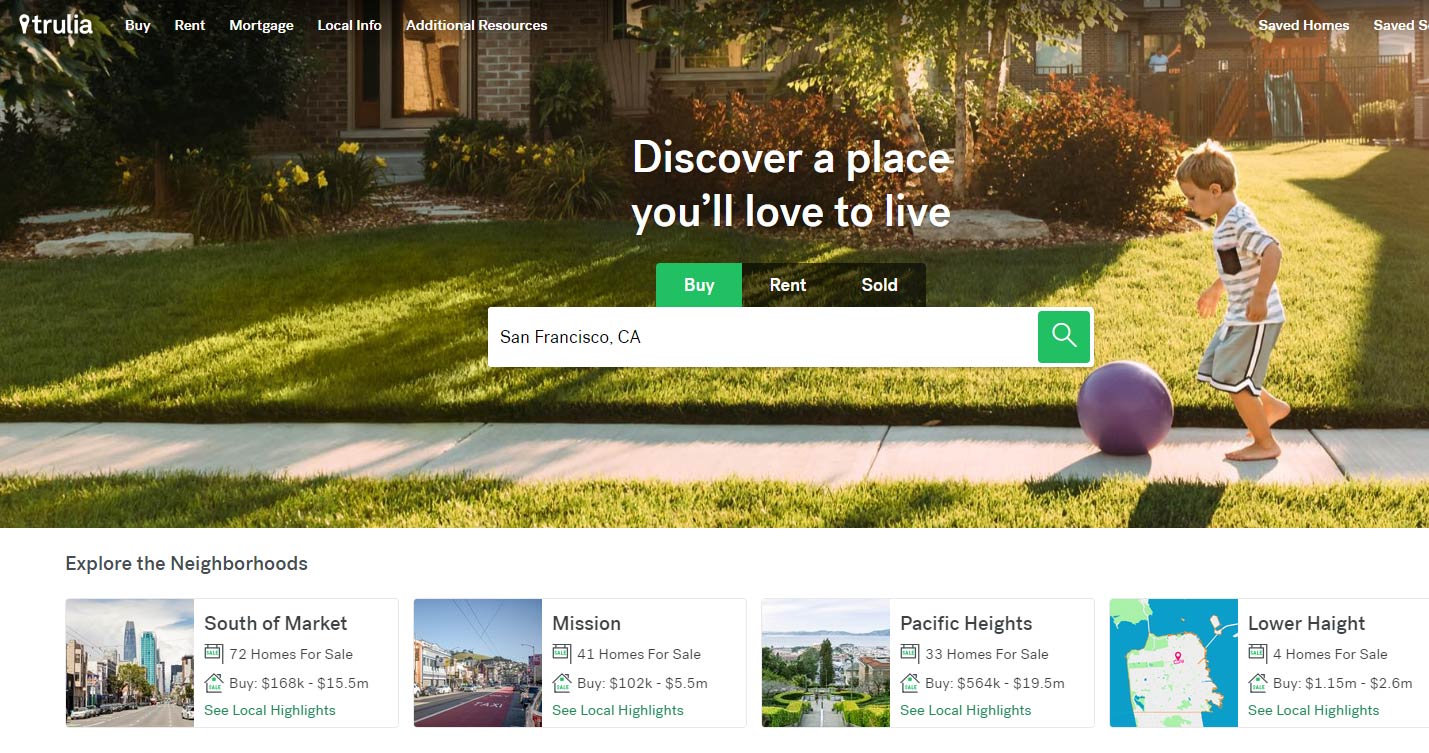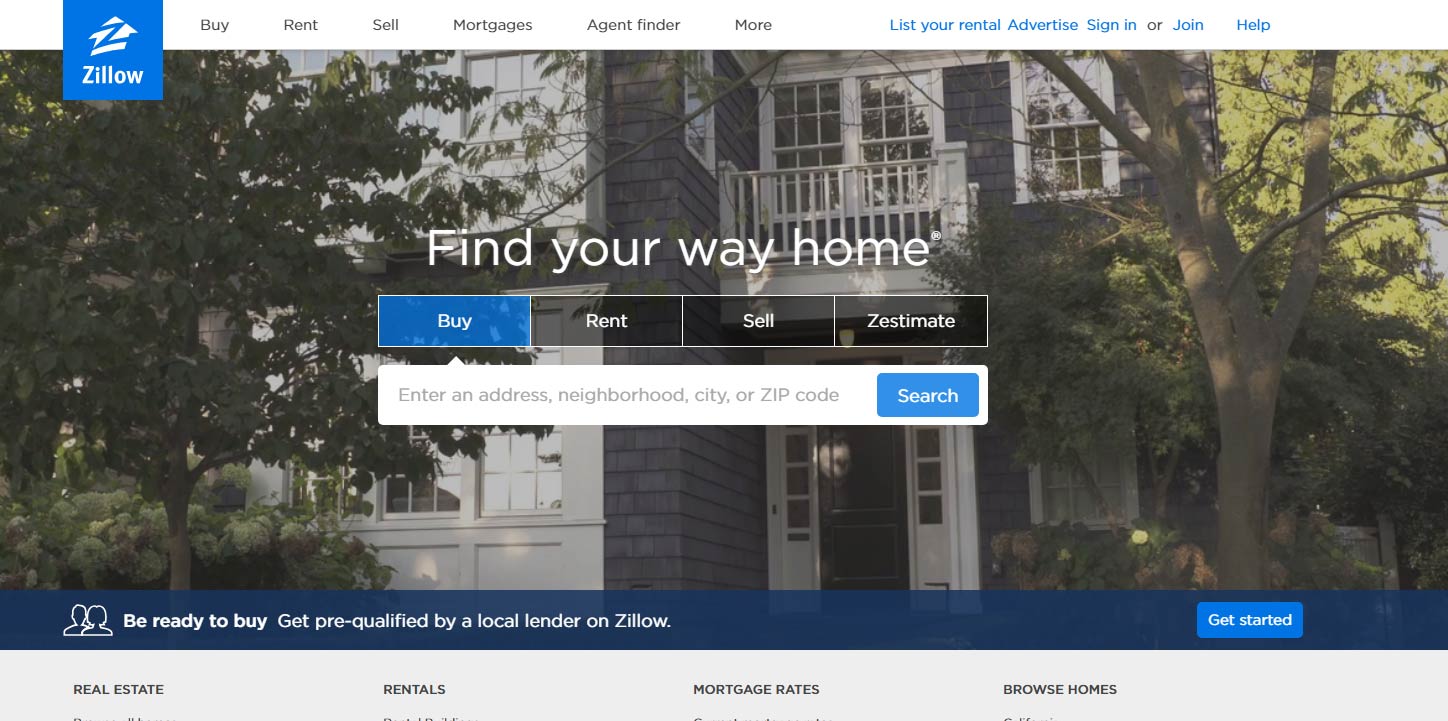Compare Trulia.com and Zillow.com
Answer: Both Trulia.com and Zillow.com function as a Multiple Listing Services (MLS) aggregator.
Buying and Selling with Trulia
Trulia is an MLS Aggregator that allows buyers and sellers to list homes and find out what local homes are available for sale. Trulia aggregates home listing data from thousands of private MLS databases across the United States.
By making this otherwise unavailable information to consumers, the company creates a positive value-added experience with local results for a vast majority of available listings.
Trulia generates revenue with ads using Zillow Group's Premier Agent and Premier Broker programs.
Trulia Pricing
Trulia does not offer paid services to consumers directly, instead, portal generates revenue with ads and referral fees from real estate brokers as part of the Zillow Group.
Listing Services
- This Service Does Not Represent Sellers
Buyer's Agent Services
- This Service Does Not Represent Buyers
Trulia.com Editor's Review:
Trulia is a Zillow Group subsidiary with similar search results, data, and options available to consumers. Trulia is an Internet MLS aggregator, where brokers and consumers may post listings independently. Until recently Trulia was an Internet company, not a real estate broker.
In 2018 Trulia’s parent company Zillow Group began to operate a pilot program called Zillow Premier Broker.
This program operates as an actual real estate broker in order to collect hidden referral fees from any leads originated via Trulia. Anytime consumers use Trulia and provide this portal with private information, this information is then sold for referral fees to a select group of brokers willing to pay for it. This fee is backloaded and paid only if the consumer is persuaded by the real estate agent to enter into a representation agreement.
Trulia’s original revenue generator is called Premier Agent, this is an ads-based process where agents advertise their services and consumers contact an agent themselves.
Unlike Premier Broker leads pipeline, Premier Agent process is not “blind.” When consumers use Trulia, it is impossible to tell if private information is sold to Premier Brokers and what brokers get to see it. When using Trulia, consumers should be careful not to leave any private information such as email, name or a phone number.
Where does Trulia.com operate?
Buying and Selling with Zillow
Zillow is an MLS Aggregator that allows buyers and sellers to list homes and find out what local homes are available for sale. Zillow aggregates home listing data from thousands of private MLS databases across the United States.
By making this otherwise unavailable information to consumers, Zillow creates a positive value-added experience with local results for the majority of available listings.
Zillow generates revenue with ads using Zillow Group’s Premier Agent and Premier Broker programs.
Zillow Pricing
Zillow does not offer paid services to consumers directly, instead, the portal generates revenue with ads and referral fees from real estate brokers.
Listing Services
- This Service Does Not Represent Sellers
Buyer's Agent Services
- This Service Does Not Represent Buyers
Zillow.com Editor's Review:
This review is focused on Zillow as an MLS aggregator, separate from the referral fee network (Zillow Premier Broker) and (Zillow Instant Offers). Two separate reviews are assigned to Zillow Premier Broker and Zillow Instant Offers programs. As an MLS aggregator, Zillow benefits real estate consumers with highly accurate MLS data and home value estimates.
Today, most consumers ready to buy or sell real estate begin their search on the Internet. This is a logical first step that can help identify similar properties, pricing budget to help make the correct decision about buying or selling real estate. Zillow is one of the main and most well-known sources of such information. Zillow analyzes property values, aggregates data and displays results that make sense to seasoned real estate professionals as well as newbie home buyers and sellers.
Undeniably, Zillow, has a great wealth of aggregate MLS property information, an easy-to-use interface, valuable neighborhood information, excellent user reviews and a wide array of real estate-related services, articles, and forums. Zillow is one of the top real estate platforms in the United States and will likely remain there with acquisitions of Trulia.com, Streeteasy.com, and RealEstate.com “mirror” platforms. The chances are that a consumer either buying or selling a home uses Zillow platform or one of its affiliates as part of their real estate transaction experience.
Zillow is technically free, but Zillow is funded with advertising and referral fees. Zillow advertising costs vary by ZIP code, cost per impression and Premier Broker referral fees are currently hidden from consumers. Agents that sign-up for their Premier Agent program "get in front of buyers and sellers in the largest online real estate network."
This fact ultimately means that real estate agent recommendations provided to real estate consumers by Zillow are biased. Those agents that pay Zillow for Premier Agent accounts consistently show up first in their search results without a clear indication of Premier status. Thus, an agency at the top may or may not be the best choice, yet Zillow implies to its users that it is.
As of 2019, Zillow has further turned to “broker mentality” against consumers with an introduction of Zillow Premier Broker and Zillow Instant Offers programs. Both of these programs effectively take Zillow into a middle-man real estate broker category, and away from an independent portal. Zillow had designed these programs to “trade consumers as leads” and push buyers and sellers onto a select group of real estate agents in exchange for hidden referral fees.
Unlike the Premier Agent program, where agents simply pay for ads, Premier Broker is a pay-for-play lead generator pipeline that qualifies consumers as a service.
This literally means that Zillow qualifies consumers into a commodity where agents buy that commodity; Zillow calls this a “flexible” payment option. Zillow CEO states that “it simplifies selling process because it de-risks the purchase decision for advertisers.” There is no upfront fee to brokers when they receive consumers info as validated leads, so there is no risk to the broker if they quote a consumer a "standard" commission – if the broker doesn’t get the business, they move on to the next validated lead with their overpriced commission offerings.
Like any other limited agent referral network of agents who are willing to pay “industry standard performance advertising expense” the only job for Zillow here is to push a few agents onto consumers en masse. With even a small percent success rate, each time Zillow converts consumers into leads, it receives thousands or tens of thousands in referral fees, typically set at 25%-40% of the commission. This business model is called reverse competition, where Zillow still refuses to acknowledge the exact amount in referral fees it receives from this new program.
The only way real estate agents are able to pay 25%-40% of their commission to Zillow is to either reduce service or jack up the price. Consumers should be careful not to provide their complete information to Zillow including name, email and a phone number in order to avoid being "sold as leads" to random real estate brokers.



